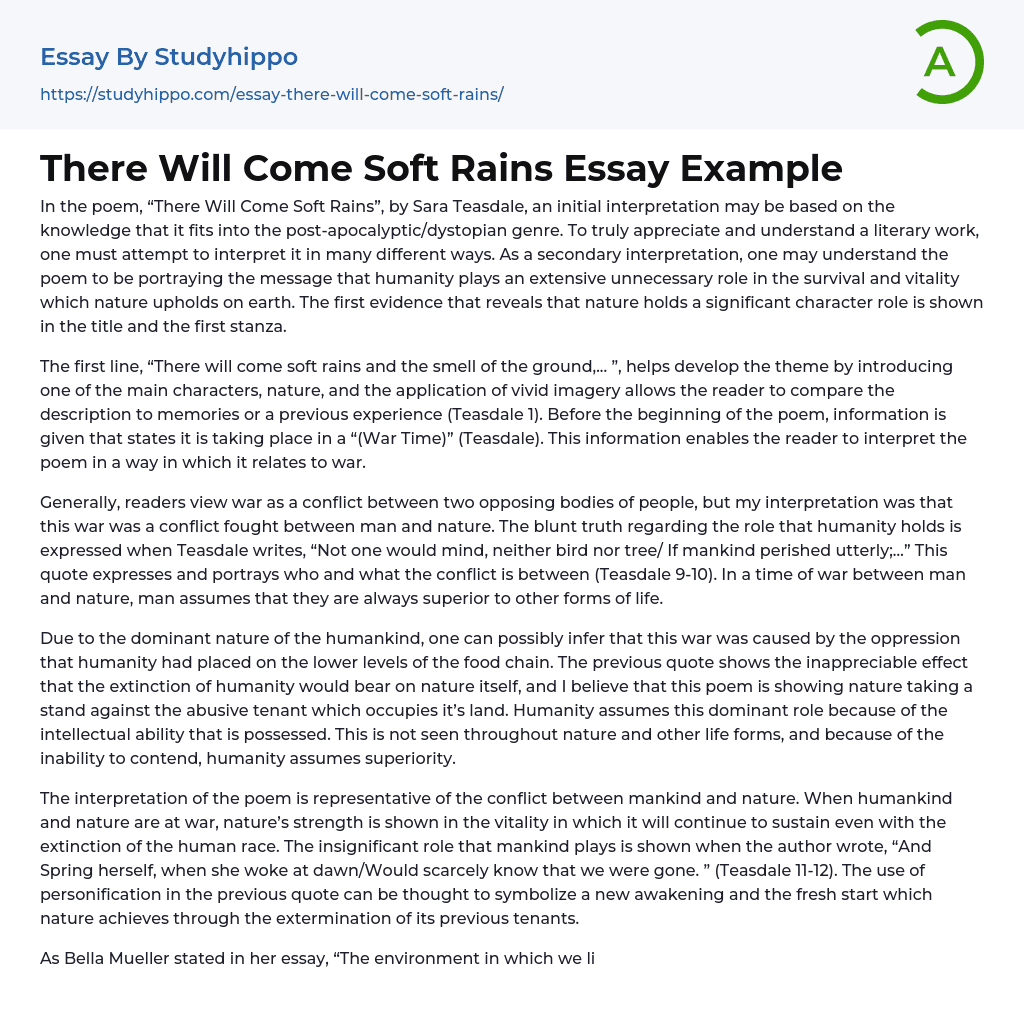In the poem, “There Will Come Soft Rains”, by Sara Teasdale, an initial interpretation may be based on the knowledge that it fits into the post-apocalyptic/dystopian genre. To truly appreciate and understand a literary work, one must attempt to interpret it in many different ways. As a secondary interpretation, one may understand the poem to be portraying the message that humanity plays an extensive unnecessary role in the survival and vitality which nature upholds on earth. The first evidence that reveals that nature holds a significant character role is shown in the title and the first stanza.
The first line, “There will come soft rains and the smell of the ground,... ”, helps develop the theme by introducing one of the main characters, nature, and the application of vivid imagery allows the read
...er to compare the description to memories or a previous experience (Teasdale 1). Before the beginning of the poem, information is given that states it is taking place in a “(War Time)” (Teasdale). This information enables the reader to interpret the poem in a way in which it relates to war.
Generally, readers view war as a conflict between two opposing bodies of people, but my interpretation was that this war was a conflict fought between man and nature. The blunt truth regarding the role that humanity holds is expressed when Teasdale writes, “Not one would mind, neither bird nor tree/ If mankind perished utterly;…” This quote expresses and portrays who and what the conflict is between (Teasdale 9-10). In a time of war between man and nature, man assumes that they are always superior to other forms of life.
Due to the dominan
nature of the humankind, one can possibly infer that this war was caused by the oppression that humanity had placed on the lower levels of the food chain. The previous quote shows the inappreciable effect that the extinction of humanity would bear on nature itself, and I believe that this poem is showing nature taking a stand against the abusive tenant which occupies it’s land. Humanity assumes this dominant role because of the intellectual ability that is possessed. This is not seen throughout nature and other life forms, and because of the inability to contend, humanity assumes superiority.
The interpretation of the poem is representative of the conflict between mankind and nature. When humankind and nature are at war, nature’s strength is shown in the vitality in which it will continue to sustain even with the extinction of the human race. The insignificant role that mankind plays is shown when the author wrote, “And Spring herself, when she woke at dawn/Would scarcely know that we were gone. ” (Teasdale 11-12). The use of personification in the previous quote can be thought to symbolize a new awakening and the fresh start which nature achieves through the extermination of its previous tenants.
As Bella Mueller stated in her essay, “The environment in which we live would be thankful to get rid of the humans that are polluting it,…” (Mueller 2). I agree with Mueller’s statement because although nature would notice if mankind were to disappear, it would be minimally affected and continue on ‘living’. The strength that nature possesses is more powerful than any power that man could hope to harness. Everything that man has is supplied by nature,
and nature has the power to take it away at any time.
The humbling power of natural disasters continuously reminds mankind who is the more powerful of the two forces. Humankind has the tendency to assume power over everything that does not actively oppose it. This poem is telling the story of the conflict fought between humanity and nature, where nature rises against its oppressor and reclaims the land that it is entitled to. Interpreting this poem using a lens other than dystopian, one may understand the theme to be the astounding insignificance that mankind actually plays in the continuing survival and longevity which nature upholds on earth.
- Population essays
- Cultural Assimilation essays
- Demography essays
- Ethnographic essays
- Population Growth essays
- Academia essays
- Higher Education essays
- Language Learning essays
- Studying Business essays
- Education System essays
- Study essays
- First Day of School essays
- Scholarship essays
- Pedagogy essays
- Curriculum essays
- Coursework essays
- Studying Abroad essays
- Philosophy of Education essays
- Purpose of Education essays
- Brainstorming essays
- Educational Goals essays
- Importance Of College Education essays
- Brown V Board of Education essays
- The Importance Of Higher Education essays
- Online Education Vs Traditional Education essays
- Academic And Career Goals essays
- Academic Integrity essays
- Brown Vs Board Of Education essays
- Distance learning essays
- Technology in Education essays
- Vocabulary essays
- Writing Experience essays
- Importance of Education essays
- Early Childhood Education essays
- Academic Degree essays
- Academic Dishonesty essays
- School Uniform essays
- Academic writing essays
- Cheating essays
- Bachelor's Degree essays
- MBA essays
- College Life essays
- Grade essays
- Diploma essays
- Phonology essays
- Sentence essays
- Filipino Language essays
- Pragmatics essays
- Millennium Development Goals essays
- History Of Education essays




